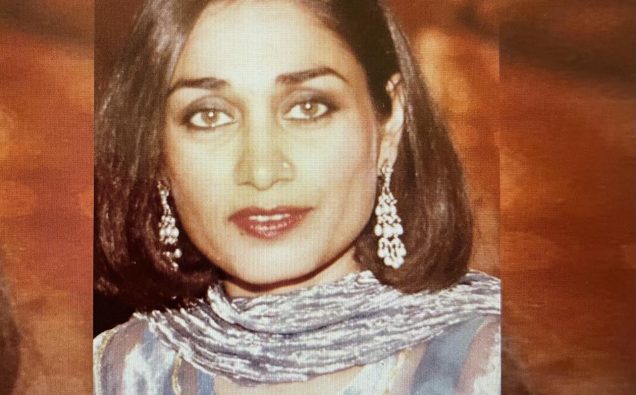
Nuscie Jamil is a remarkable figure in Pakistan’s political history with an indelible mark as a prominent left-wing politician. Her journey into the world of politics and activism has been driven by a strong commitment to the cause of the laborers and peasants.
Her passion for change has led Nuscie to work extensively through theater as a means to convey her message to the masses.
Her political awakening gained momentum upon her encounter with the influential left-wing leader, Tariq Lateef. Under his guidance, she embraced the tenets of leftist ideology and activism, fostering a deep commitment to social change. Collaborating with prominent figures like Tariq Latif, Chowdhry Gulzar, and Rubina Jamil, renowned trade union leaders in Lahore’s industrial landscape, Nuscie played a pivotal role in various labor movements, notably in Wyth Laboratories and other factories. Fueling her passion for learning, she subsequently enrolled at the School of Arts and Communication (SOAC), where she delved deeper into the intricacies of social and political dynamics..
It was at the SOAC that Nuscie delved deep into the teachings of Marxism, a foundation that would shape her future endeavors.
Nuscie’s political journey coincided with a crucial period in Pakistan’s history when left-wing politics was gaining momentum. The Mazdoor Kisan Party (MKP), of which Nuscie was an active member, played a pivotal role in bringing together various factions of left-wing activists.
This coalition included the Major Ishaq Muhammad group in Punjab and other leftist groups in East Pakistan, now known as Bangladesh.
The MKP, she says, championed the cause of the peasantry, drawing inspiration from the struggles of peasant movements in China, Vietnam, and Africa. They recognized the plight of Pakistani peasants and their ongoing battles against powerful landlords. The MKP provided much-needed organization and leadership to these spontaneous uprisings, leading to a surge in support during the late 1960s and early 1970s.
However, the road to change was not without challenges. The MKP faced opposition from both private armies of landlords and state forces. The movement persisted through the tenures of three different governments: Yahya Khan’s military regime, the government formed by the National Awami Party (NAP) and Jamiat Ulema-e-Islam (JUI), and the provincial government of the Pakistan People’s Party (PPP).
As the peasant movement gained its strength, landlords from various political backgrounds joined forces with the Ittehad Party to suppress the rebellion. Even though the provincial NAP-JUI government sided with the landlords, the MKP continued its struggle unabated.
In the realm of left-wing politics, the power of expression extends far beyond rhetoric and manifestos. One often overlooked yet remarkably potent tool in the arsenal of progressive movements is the performing arts.
Whether it is theater, music, dance, or visual arts, these creative mediums have played a pivotal role in conveying messages of social justice, equality, and change. There has been a profound impact of the performing arts on left-wing politics and Nuscie harnessed this tool to empower and uplift the masses in Pakistan.
The performing arts are, at their core, vehicles for storytelling. Through compelling narratives and powerful emotions, artists can engage audiences on a visceral level. Nuscie a dedicated left-wing activist in Pakistan, recognized the capacity of performing arts to tell stories of oppression, exploitation, and resistance.
She used theater, music, and other artistic forms to vividly depict the struggles of laborers, peasants, and marginalized communities, fostering empathy and solidarity among viewers. She used her talents to shed light on injustices, economic disparities, and the plight of the disenfranchised in Pakistan.
Through her performances and creative endeavors, she ignited discussions, encouraged critical thinking, and inspired action. Her commitment to left-wing political agendas thrived when the public became informed and engaged, thanks to the powerful catalyst of performing arts.
Nuscie understood that changing the status quo in Pakistan required more than altering the political structures. It involved challenging and redefining the prevalent cultural norms.
With all this work she courageously challenged prevailing narratives and promoted alternative perspectives, dismantling stereotypes and prejudices in the process.
Left-wing politics hinge on the unity of the working class and marginalized groups. Nuscie Jamil recognized that performing arts, by their very nature, are inclusive. They transcend language and socio-economic barriers, appealing to diverse audiences.
Like other artists, she also employed symbolism to convey complex ideas and emotions. Her work contributed to the creation of powerful and enduring images that became rallying points for activists.
Iconic symbols, songs, and performances reinforced the commitment of those fighting for a fairer and more just Pakistan, with Nuscie at the forefront of this artistic and political movement.
Nuscie’s use of performing arts as a tool in left-wing politics is an important part of Pakistan’s struggle for social justice and equality. Through her art, she told stories, raised awareness, sparked cultural change, united diverse communities, and symbolized the collective desire for a better society.
Her legacy serves as a testament to the enduring power of the performing arts in advancing the cause of the marginalized and disenfranchised in Pakistan.
Nuscie’s contribution to left-wing politics in Pakistan, particularly her role in the MKP, remains an integral part of the nation’s political history. Nuscie’s legacy is a testament to the enduring spirit of those who dare to challenge the status quo in pursuit of justice and equality.








